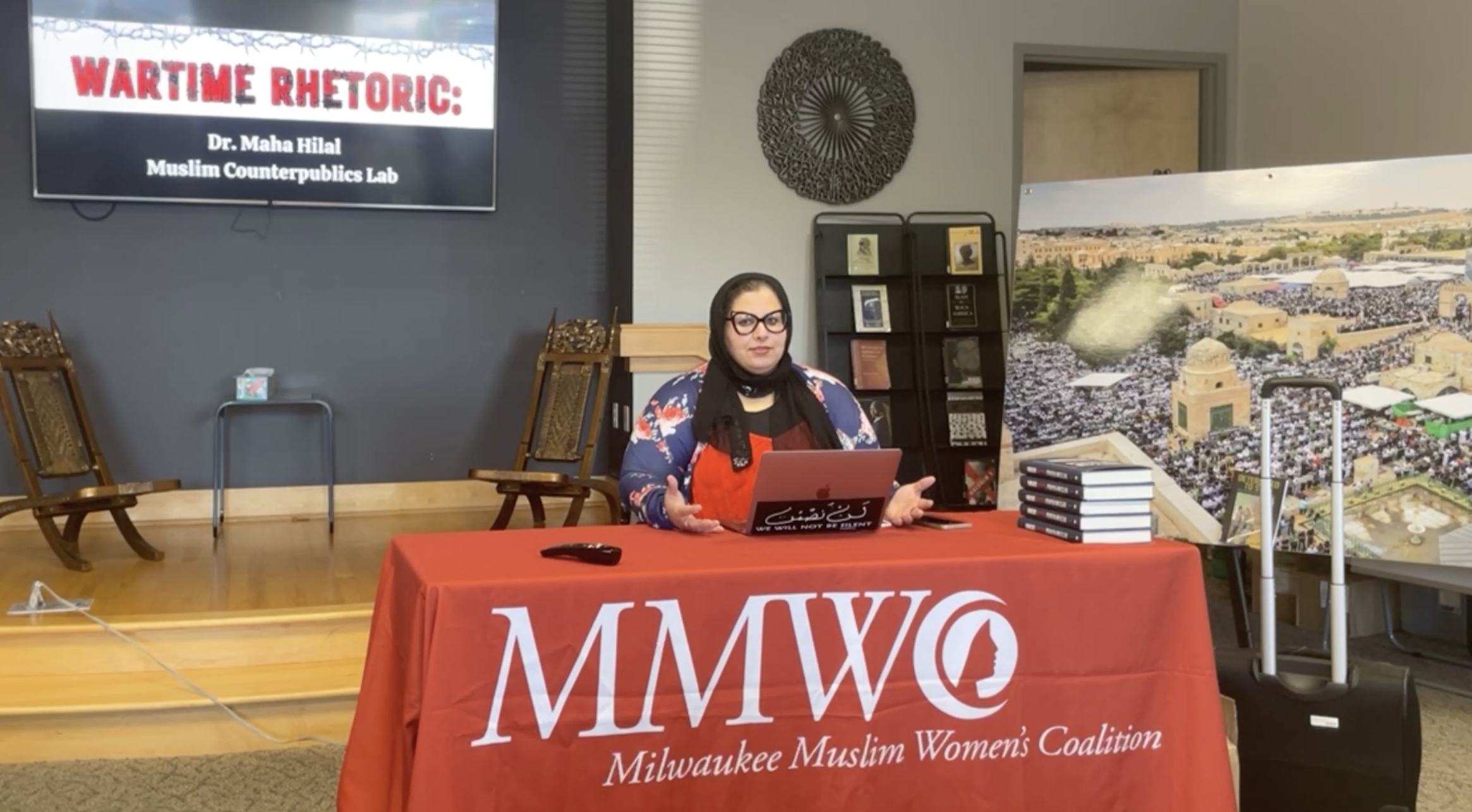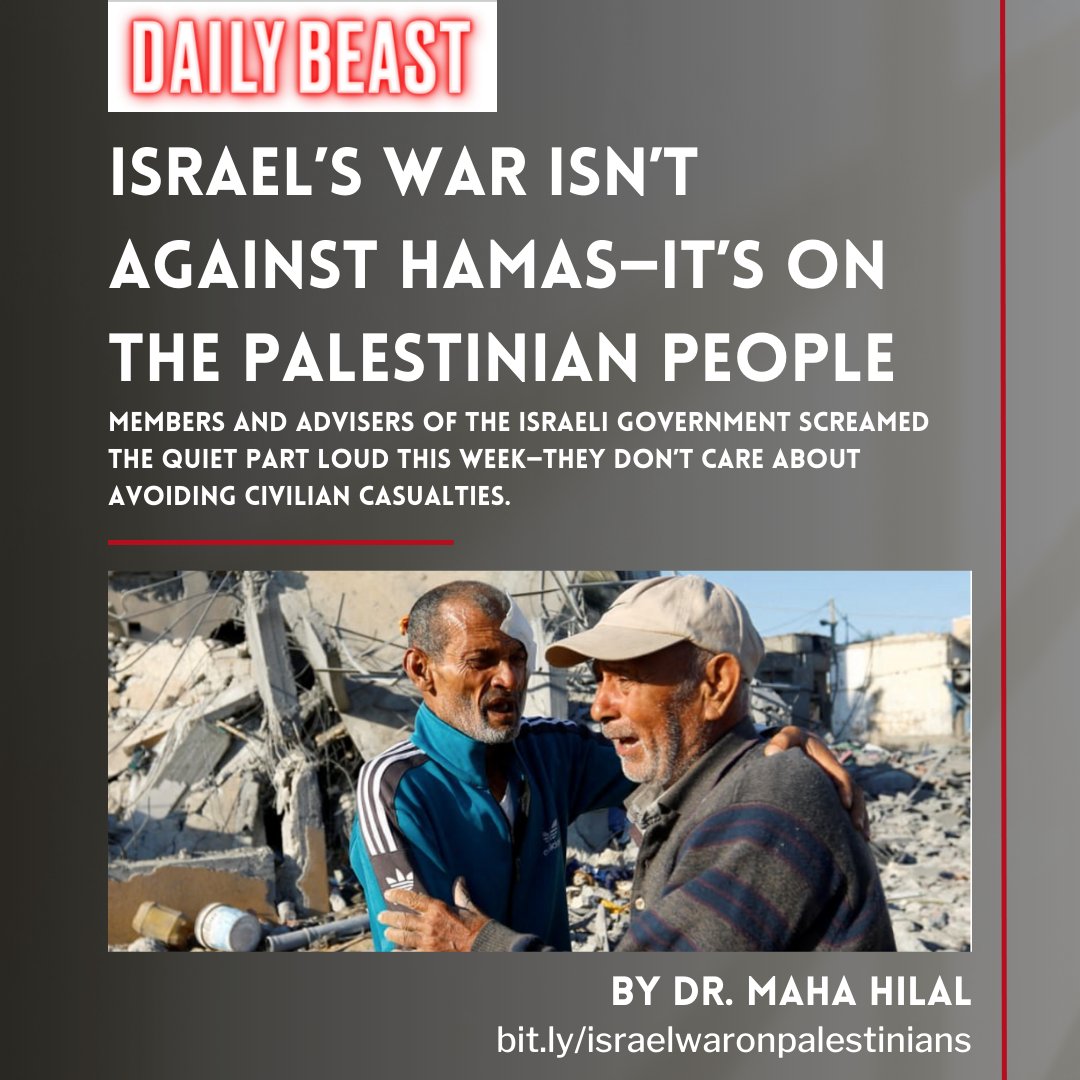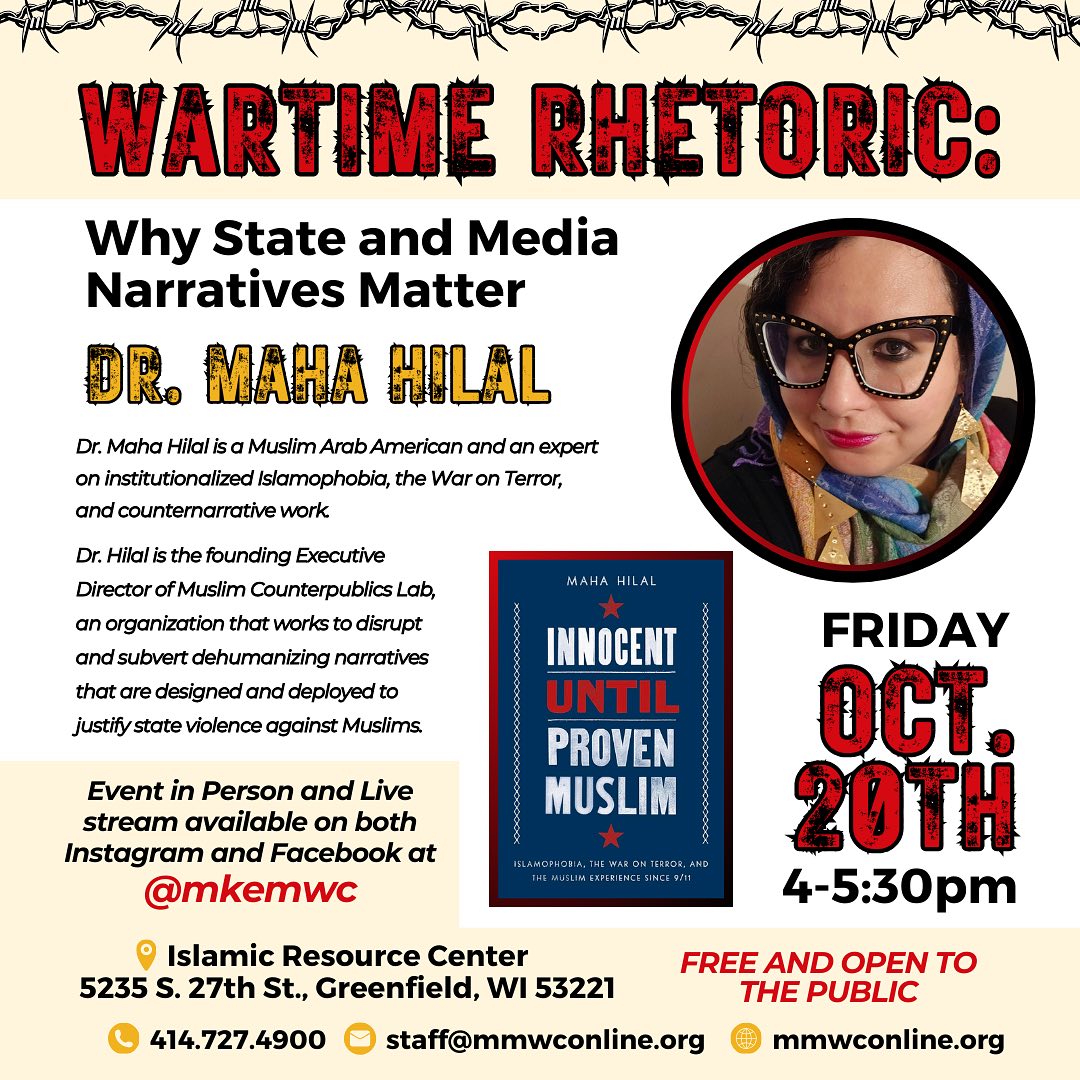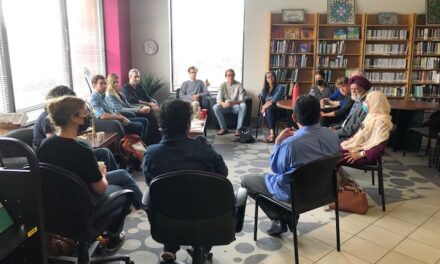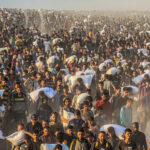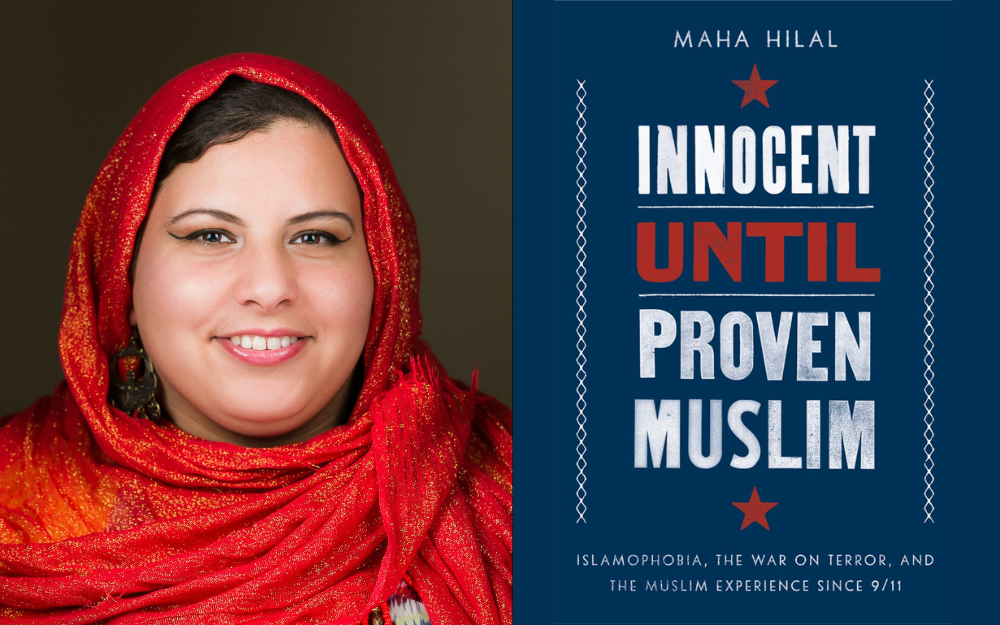
At a talk hosted by the Milwaukee Muslim Women’s Coalition, Maha Hilal, Ph.D., discussed similarities between rhetoric about the U.S. War on Terror, the subject of her 2021 book Innocent Until Proven Muslim, and Israel’s War on Gaza.
“Language is a powerful tool,” wrote Maha Hilal, Ph.D., in her book Innocent Until Proven Muslim, Islamophobia, The War on Terror, and The Muslim Experience Since 9/11. “It can start wars, sustain them, change their course or end them … the power of language … has been leveraged to predetermine innocence and guilt, to define who counts as human and who is merely a faceless enemy or collateral damage, and to justify the sovereign’s control over who gets to live or die.”
Dr. Hilal, an expert on institutionalized Islamophobia, the War on Terror and counternarrative work, with a doctoral degree in justice, law and society from American University in Washington, D.C., and a master’s degree in counseling from the University of Wisconsin, spoke Friday at the Islamic Resource Center, 5235 S. 27th St., Greenfield, about rhetoric in the news media and from the United States government about Israel’s War on Gaza. “It is important to understand how language shapes our perception of the world if we want to challenge the narrative,” Hilal said.
Hilal, who grew up in Wisconsin and whose mother still lives here, came to Milwaukee for the Milwaukee Muslim Film Festival, where she led the talkback discussion about the film Rabiye Kurnaz vs. George Bush, a 2022 film about a Turkish housewife from Germany who secured the release of her son from Guantanamo Bay in a case that went to the Supreme Court. Hilal’s research explores how, in the two decades of the War on Terror, “the official narrative has justified the creation of a sprawling apparatus of state violence rooted in Islamophobia and excused its worst abuses,” her book jacket explains.
In her talk at the IRC, hosted by the Milwaukee Muslim Women’s Coalition, Hilal drew parallels between the language used by the government and news media in the War on Terror and in the current Israeli War on Gaza. She explained how the language and narrative construction about what is happening in Gaza erases history, obscures reality and dehumanizes the Palestinian people.
Here is a paraphrase of her comments:
The rhetoric of war
What we’re going to talk about today is what is happening right now, Israel’s war on the Palestinians, the genocide of the Palestinians, and the kind of language that’s used to justify this violence. Part of getting society to accept violence is to present it in terms that make violence necessary.
What we have seen over the last two weeks is a lot of propaganda, a lot of false narratives and a lot of ways states and governments create and assign meaning to events and tell us what we’re supposed to think. One thing I study is the ways in which Muslims are constructed as barbaric, as uncivilized, as opposed to democratic values and how those ideas inevitably enter into the policy and legal sphere. When you dehumanize people, it becomes much easier to kill them. It becomes much easier to displace them.
Dr. Maha Hilal told an audience at the Islamic Resource Center that language is often used to defend the indefensible.
She noted another tactic, the use of euphemism, which English writer George Orwell called “the defense of the indefensible” in his essay Politics and the English Language (1946).
Orwell wrote: “Defenseless villages are bombarded from the air, the inhabitants driven out into the countryside, the cattle machine-gunned, the huts set on fire with incendiary bullets: this is called pacification. Millions of peasants are robbed of their farms and sent trudging along the roads with no more than they can carry: this is called transfer of population or rectification of frontiers. People are imprisoned for years without trial, or shot in the back of the neck or sent to die of scurvy in Arctic lumber camps: this is called elimination of unreliable elements. Such phraseology is needed if one wants to name things without calling up mental pictures of them.”
There’s a way that language is deployed to eliminate and erase the human impact, said Hilal. It is much easier to kill someone if you refer to them in animalistic terms. It is much easier to detain people or send them away if you are talking about “pacification.”
For example, when on Sept. 20, 2001, President Bush first used the term ‘War on Terror,’ he implied it was not a war on people. In essence, here’s a blank check to go to war and inflict violence on whoever you want.
He also said the war’s purpose is to bring justice. But justice is not an objective term. He is setting up the terms of justice, which is to say that whatever the United States says is justice is justice and we shouldn’t question that.
President Bush also said every nation had a decision to make—either you are with us or you are with the terrorists. A few days ago, Israeli Prime Minister Benjamin Netanyahu said the civilized world should unite behind Israel to fight and eradicate Hamas. In both cases, Bush’s speech and Netanyahu’s speech extend the violence that happened internally to this larger fight they say everyone should join because it’s a moral fight.
In Netanyahu’s quote, he talks about “civilization.” This kind of language is frequently deployed when talking about some countries they want to excuse and justify violence against other countries. Obviously, there are particular countries you can call ‘uncivilized.’ You wouldn’t refer to a European country as uncivilized. This language is meant to indicate that it’s okay to kill those people whom we construct as uncivilized.
Netanyahu is also using the term ‘axis of evil,’ taking this term from the U.S. War on Terror’s narrative infrastructure. Applying this term to Iran, Hamas and Hezbollah implies they are working toward the same thing. Are they? It takes each out of its context.
Lumping them together is a way of enlisting states’ support to make other countries feel they have a stake in this fight.
Erasing history
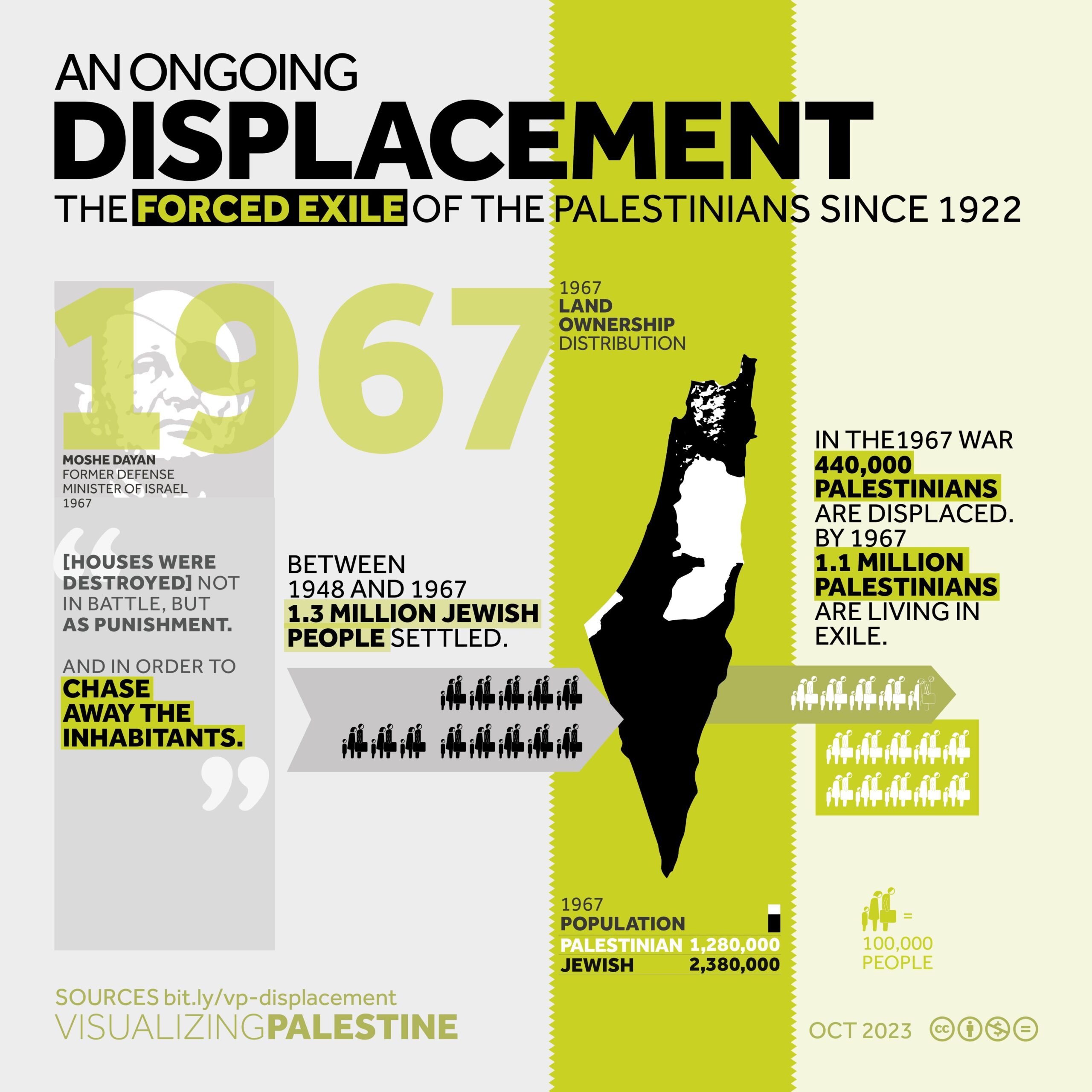
Dr. Hilal discussed the importance of context. Violence in Gaza did not begin on Oct. 7, she said.
What is the timeline for the wars in news accounts? In the case of The War on Terror, the assumption is that it began on Sept. 11, 2001, in response to the attack on the World Trade Center. Reports about Israel’s War on Gaza often say it started on Oct. 7 with the Hamas attack on villages in Israel. It is a very strategic and intentional way that time is being used.
It’s a deliberate erasure of history. And when you erase history, you can’t examine any of the root causes that would have caused the violence.
Political leaders called both the 9/11 attack and the Oct. 7 attack ‘evil.’ Evil communicates that it is an inherent characteristic. You can’t reason with evil. You can’t negotiate with evil. The only response is brute force. By using the word ‘evil,’ they are suggesting that there is no explanation as to why this violence happened in the first place. There is no possibility to see either of these as struggles for resistance or to provide explanations about why they are resisting.
Who are the terrorists?
We keep hearing Hamas killed children. Has Israel killed children? The answer is yes. But if we say, ‘Hamas killed children,’ and that’s where the story ends, the assumption is Israel doesn’t. Has the United States of America killed women and children? Absolutely.
It is important to be aware of story construction that makes state violence morally superior and legitimate to non-state actor violence. What makes it more legitimate? How do we measure that? In every case—the number of civilians killed, the amount of destruction caused—state violence wins. So, we have to question why we allow state violence to be treated as moral and legitimate.
When states and news media talk about non-state actors as terrorists, they call the state’s action ‘counter-terrorism.’ The state’s actions are defined as a response to what the terrorists have done. It implies we had to respond in a particular way.
There’s a lot of asymmetry when we talk about Israel and Palestine. While Israel is a state with the power to go after anyone who challenges authority, Palestinians do not.
Hilal cited an Oct. 14 opinion article in The New York Times by journalist and commentator Peter Beinart, who wrote:
“The savagery Hamas committed on Oct. 7 has made reversing this monstrous cycle much harder. It could take a generation. It will require a shared commitment to ending Palestinian oppression in ways that respect the infinite value of every human life. It will require Palestinians to forcefully oppose attacks on Jewish civilians, and Jews to support Palestinians when they resist oppression in humane ways …”
Was there a parallel use of language in this quote? Hilal asked. No. So, while he’s asking Palestinians to forcefully oppose attacks on Jewish civilians, he’s not making the same request of Jewish people. And he’s not saying Israelis should also oppose attacks on civilians.
The Israel-Hamas War?
What about this construction—the Israel-Hamas War? This is how the Israeli government talks about it. This is how the media reports on it.
Is this actually a war on Hamas? No. Is it a war on Palestinians? Absolutely. If it was really on just Hamas, Israel would not be causing the destruction and murders it has.
Hamas did not attack Israel because they believed they could win against the Israeli army. That’s just not feasible considering the discrepancy in how much power, weapons and money each of them have. But putting them together in ‘Israel-Hamas War’ minimizes the violence of Israel because it suggests that Hamas is able to put up an equal fight.
If we want to objectively understand the scope, breadth and depth of Israeli violence, we have to be able to do that without all these distractions in the narrative. Israel’s war isn’t against Hamas. It’s on the Palestinians.
Hilal referred to a statement seven Democrats made on Oct. 18 to President Joe Biden that called for a ceasefire. The Hill reported it said:
“We remain outraged by the horrific terror attacks carried out by Hamas against Israeli civilians. We are also deeply alarmed by the rising civilian death toll in both Israel and Gaza, including nearly 1,400 Israelis and 3,000 Palestinians. This is a moment that calls for moral and strategic clarity. That is why we believe that the United States must help achieve an immediate ceasefire, or at minimum, a temporary cessation of all hostilities that stops the threats to civilians in Israel and Gaza.”
The statement was signed by Democratic Reps. Joaquin Castro (Texas), Greg Casar (Texas), Veronica Escobar (Texas), Jim McGovern (Mass.), Barbara Lee (Calif.), Pramila Jayapal (Wash.) and Jesús “Chuy” García (Ill.).
It talked about the horrific attacks carried out by Hamas against Israeli civilians. It mentions the rising civilian death toll in Israel and Gaza. What’s causing the rising death toll? Are people in Gaza just randomly dying? No. Israel is killing Palestinian civilians. The language is deployed to suggest there’s not a specific responsible party for their murders.
It’s also talking about a ceasefire. Who’s most going to benefit from a ceasefire. Which is the party that’s being demolished and subjected to genocide? It’s the Palestinians. But nevertheless, the statement says, ‘Let us be clear. Our call for a ceasefire should not be mistaken as a lack of support for the protection of the people of Israel.
Click on the flyer to watch Dr. Maha Hilal’s live streamed presentation at the Islamic Resource Center.
In stopping the violence and the genocide against Palestinians, they’re trying to suggest that it would make Israelis unsafe. That is a horrible threshold. You should not have to commit genocide to keep another group safe. There’s obviously a problem with your model, if that’s what it takes.
And finally, they say ‘a cessation of hostilities’ as if, again, this war is being fought on equal terms. The narrative has been so airtight to exclude the Palestinian voice. There has been very little intervening and disrupting that narrative.
A very specific narrative structure is consistently being used to minimize the violence of the state that has the power. Does anyone notice this difference in terms of when they say 70 killed in Israel versus 198 dead in Gaza. Well, how did that happen?
The implication is we absolutely have to name the cause of the deaths of Israelis, but we don’t want to name the cause of why Palestinians die because we don’t want the responsibility to be on Israel. Why? Because the violence needs to be disguised.
Hilal showed another headline: Israel-Hamas War Humanitarian Crisis Worsens in Gaza. Who’s causing the humanitarian crisis in Gaza? she asked.
Israel is causing the humanitarian crisis. It’s amazing these two things—the war and the humanitarian crisis—are being divorced. It’s as if the war is operating somehow in a different sphere than this humanitarian crisis that somehow came out of nowhere.
It’s important to look at the idea of ‘humanitarian crisis’ in the first place. That term is often used when there’s a hurricane or an earthquake, when there’s a natural disaster. In the case of what’s happening now, it’s not a humanitarian crisis, it’s genocide.
